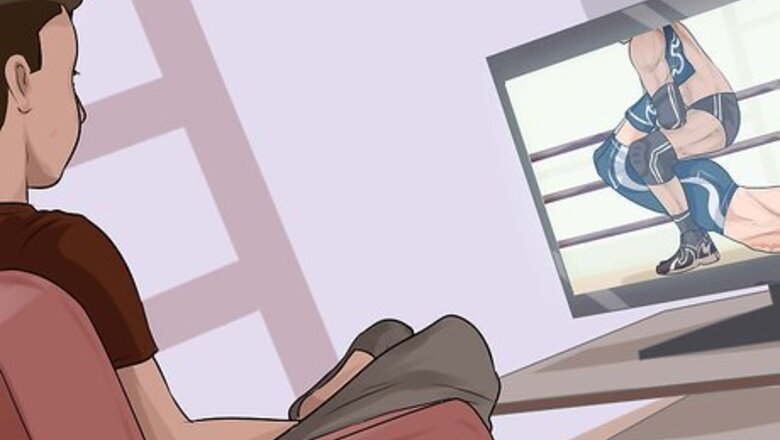
views
Getting Ready
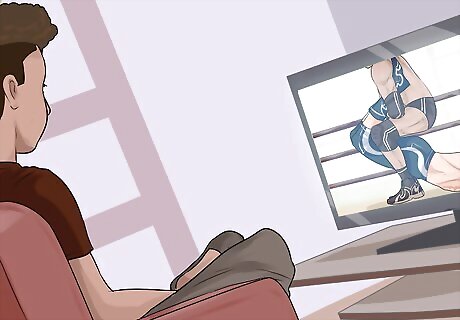
Watch the Experts. If you are interested in learning and performing pro wrestling moves, you most likely already watch WWE and/or other wrestling circuits on television. But you may want to adjust how you watch. Pay closer attention to how the moves are performed. Watch (rewatch) body and hand positioning, takeoff and landing methods, and how wrestlers “sell” the move. Keep an eye out for the safety measures hidden within the moves. Watch videos of older wrestling shows as well. Watch for similarities and differences in technique and style. Go to live wrestling shows. Even if it is a local or regional circuit with a lower caliber of performance, watching wrestlers perform in person gives you a truer sense of the complexity and power of pro wrestling maneuvers. Watch for how these ostensible opponents work in concert to complete the moves successfully and safely. Talk to some of the wrestlers if you get the chance, and let them know about your interest in learning. They may have valuable advice.
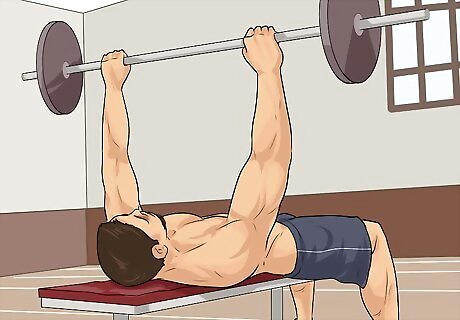
Prepare your body. Strength training is obviously important, but so too is endurance and flexibility training. Good pro wrestlers don’t just pump iron, they do intensive cardio workouts and do plenty of stretching -- even yoga! Improving your physical conditioning will give you some added protection against injury. If you’re in high school, joining the wrestling team might make sense, but playing sports in general will help with conditioning and body control. Some strength training exercises to consider include: bench presses; chin-ups; dips; biceps curls; hand grips; wrist rolls; leg curls; leg extensions; squats; leg presses; shoulder shrugs; and 4-way neck presses. Some cardio workouts to consider include: 3-mile timed runs; 10 x 400 meter interval runs; 30 minute recovery jogs; and other cardio activities such as swimming and biking. Train hard, but allow time for recovery. This is when your muscles (including your cardiovascular system) heal and in the process become stronger.
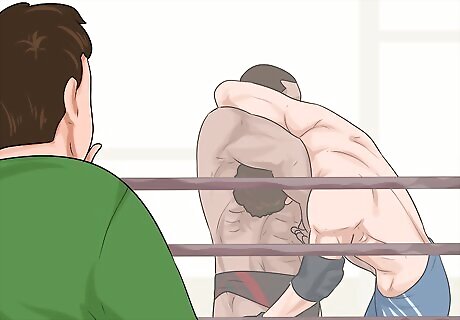
Know the risks. Watching pro wrestlers closely should give you a better idea of the intricate detail and precise timing needed to successfully complete even seemingly simple wrestling maneuvers. You’ll want to start trying out the moves you’ve been watching the pros do, maybe on your buddy in the backyard, but do not attempt them until you have been properly trained. Training, preparation, and practice will make doing wrestling moves safer, but even seasoned professionals can meet a tragic end when attempting them.
Entering the Practice Ring
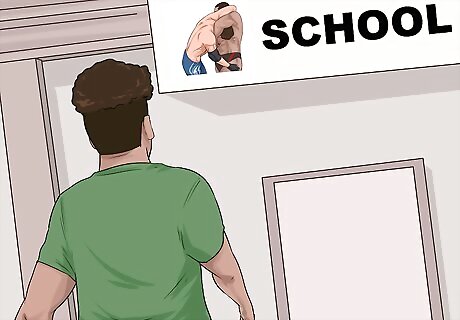
Go to a wrestling school. If you don’t know of any in your area, contact your state athletic commission for help in finding one. Seek out a school with a track record of effective, safe training. Here’s an instance where striking up that conversation with wrestlers at a local show might pay off. Be realistic with your goals. If you’re dreaming of becoming a WWE superstar, your local wrestling school almost certainly won’t cut it. Most pros train at large schools in Florida, run by former pros with a long track record. But that doesn’t mean a local wrestling school can’t provide an instructive and fun experience that could turn into something bigger if you prove you have the right stuff.
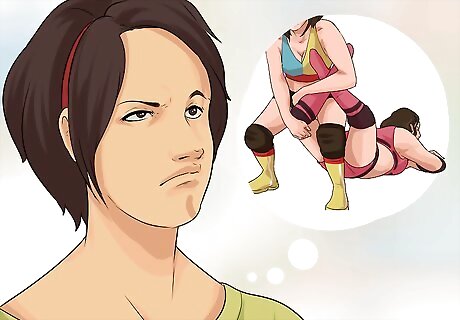
Know what to expect. Each wrestling school will be different, but expect regular instruction sessions with other aspiring wrestlers. You will work together on building your skills inside the ring, of course, but also outside it as well -- things like character creation and interviewing. Expect, and in fact demand, honest opinions on your skills. Wrestling instructors are unlikely to be shy about giving their opinion, so you’ll need a thick skin. Think of it as tough love -- doing these moves safely and effectively requires precision every time.
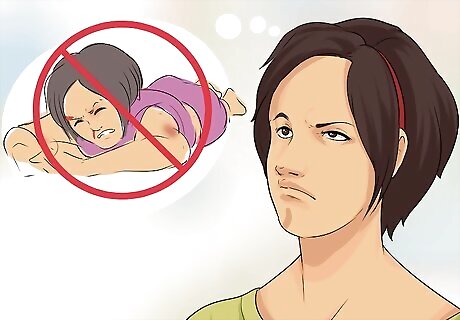
Learn to compete safely. If you find that safety is not the first priority at your wrestling school, strongly consider finding a new one. Don’t risk your health or that of your classmates unnecessarily.
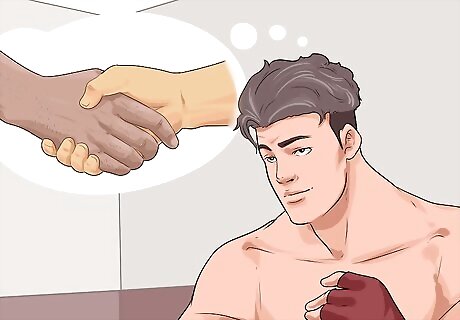
Be on the same page as your opponent. When you do begin to practice moves, remember that successful pro wrestling moves always require successful execution by both parties. Start slow and build up a familiarity and trust factor with your practice ring foes. Pro wrestlers tend to think of their ring mates more as teammates than opponents. They need to practice and execute together in order to succeed, just like a basketball team.
Familiarizing Yourself with Key Moves

Study and visualize these moves, but don’t perform them without proper training. Use the descriptions and steps below as a reference to familiarize yourself with the intricacies of ten classic pro wrestling maneuvers that would be taught in wrestling school. Think of this section as reading user manuals before having a knowledgeable friend teach you to use power tools. It is a preparation aid, not an alternative to expert guidance regarding something that can cause harm to you or others.
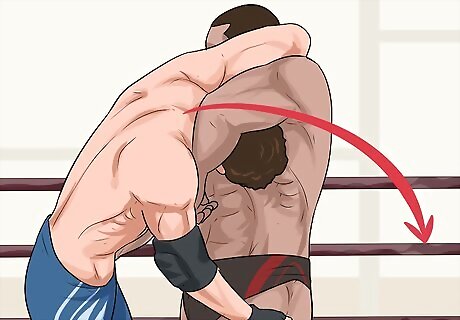
Get to know the Suplex. There are numerous variations of this essential move, which entails lifting your opponent over your head, arching your back, and slamming him down on his back as you fall. From behind, lock your arms around your opponent’s waist Bend your knees, pop your hips out and lift your opponent. Arch your back and throw him over your head onto his back as you fall. For more detailed steps with images, see also Perform Suplexes in Pro Wrestling.
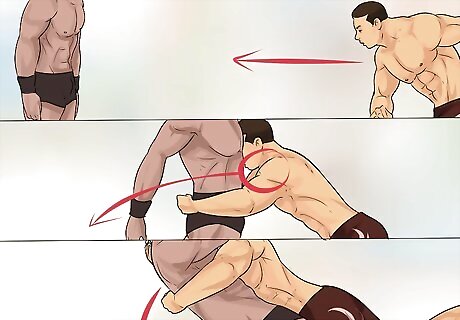
Study the Spear. Spearing is a simple but effective attack, akin to the (now illegal) football tackling method of driving your head into the opponents chest to take him down. Run toward your standing opponent. Lower your body and launch into his midsection. Try to hit him in the abdomen with your shoulder while keeping your head to the side. Use your arms to help drive him into the mat. See also Spear Like a Wrestler.
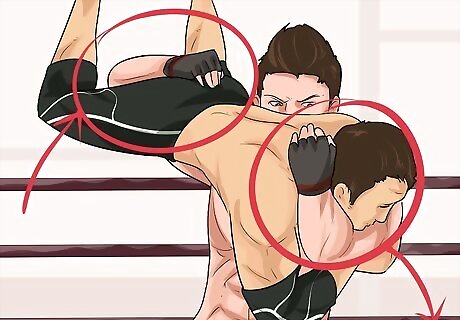
Raise your knowledge about the Andre Slam. This is a straightforward lift-and-slam move, immortalized by Hulk Hogan and Andre the Giant in Wrestlemania III. Facing your standing opponent, grab an arm with your weak hand and lift him with your strong arm between his legs. Duck your head as you lift him onto your shoulders. Rotate him onto your strong arm side and continue the turn as you slam him down. See also Perform an Andreslam in Pro Wrestling.
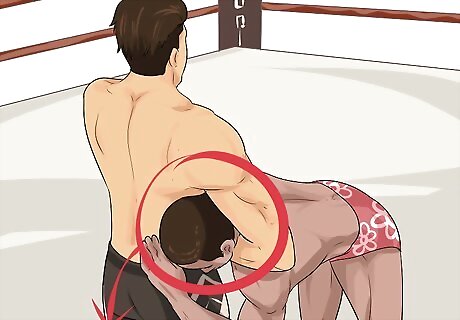
Learn the “do”s and “don’t”s of the DDT. This maneuver involves putting your opponent (who is facing you) into a headlock, then slamming him face-first into the mat as you both drop. Facing your opponent, put him in a front headlock, wrapping your arm around his head to the side of one of your hips. Fall backward and drive his face into the mat. Add some flair to your fall to make it unique. See also Perform a DDT in Pro Wrestling.
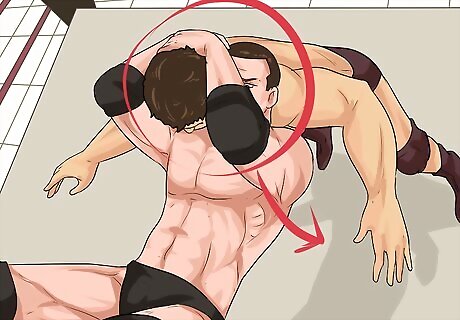
Cut through the mysteries of the Cutter. Known in popular variations as the Diamond Cutter or the RKO, this move entails pulling your opponent's jaw onto your shoulder (from behind you) and slamming him face down. Place your hand on the back of your standing opponents neck. Twist so that you are in front of him and your arm is around his head. Pull his chin onto the shoulder of the arm around his head. Kick your legs out forward, falling on your back and slamming his face into the mat in the process. See also Perform a Cutter Move in Pro Wrestling.
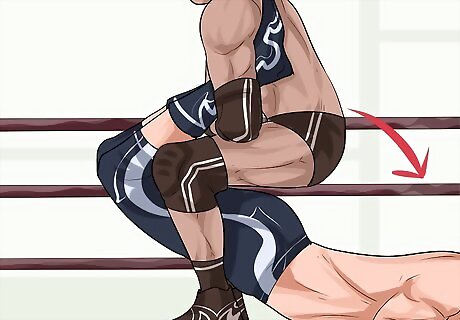
Latch on to the Boston Crab. This is a classic tap-out move when your opponent is on his back -- you flip him, squat over him, and pull his legs up and back. With you opponent on his stomach, stand over him, straddling his hips and facing his feet. If he’s on his back, lift his legs while facing him, and step over him while flipping him over and turning yourself around. Grab each leg and pin each at the calf between your biceps and upper ribs. Lift and pull each leg up and towards you while squatting down on his lower back. See also Do a Boston Crab.
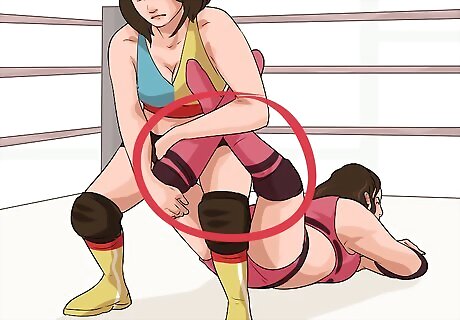
Be smart about the Sharpshooter. One of the most popular finishing holds when the opponent is on his back in the middle of the ring, it combines elements of the Boston Crab and the Figure Four Leg Lock. Follow the steps for the Boston Crab, except instead of straddling your opponent’s legs, place one leg between his at the knees. Cross his legs over that knee and start lifting, pulling, and squatting. See also Do the Sharpshooter.
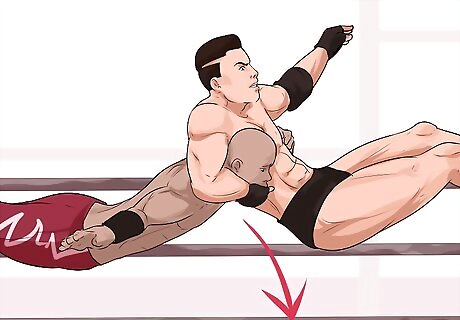
Shine a light on the Shining Wizard Combo Move. This move's many variations share a strike to the opponent's head with a knee or leg, followed by driving his head into the mat. With your opponent slouched in a corner of the ring, run at him and strike him in the jaw with your knee or lower leg. You can launch off his knee with your other foot. This move alone constitutes the Shining Wizard. Put your arm around his neck, placing his head to your side with his crouched body behind you. Run a few steps forward, dragging him along. Kick your legs out forward, and as you fall, drive his face into the mat. See also Perform a Shining Wizard Combo Move in Pro Wrestling.
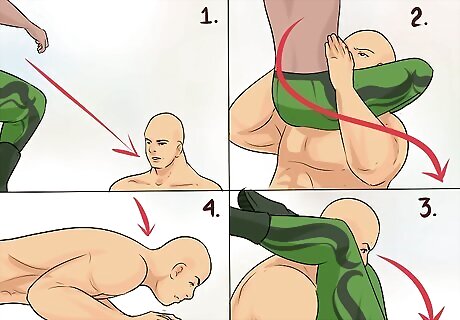
Take a spin around the Hurricanrana. The Hurricanrana is a very athletic move involving jumping on your opponent's shoulders, then flipping down while pulling your opponent into the mat. Run at your standing opponent and leap up and out so that your legs each land on one of his shoulders. As this happens, cross your ankles behind his head and twist your body to one side. Use this twisting motion to rotate him as he falls on his back while you also fall. See also Perform a Hurricanrana in Pro Wrestling.
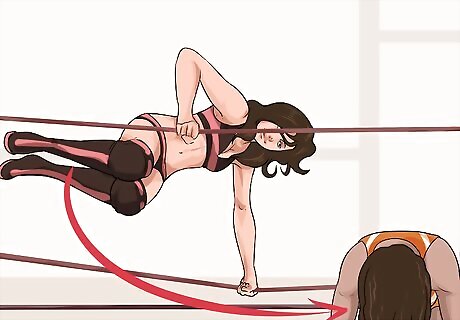
Unlock the mysteries of the 619 Move. The most acrobatic move discussed here, the 619 involves swinging through the ropes while holding on, then striking your opponent in the face with your knees as you swing back. Put your opponent into the position where he is draped over the middle rope, facing the crowd. Run towards him but to one side or the other. Leap feet-first between the top and middle ropes. Grab the top rope with one hand and the middle rope with the other as you pass through. Use the elasticity of the ropes to sling you back towards the ring. Position and tuck your legs so that your knees strike your opponent in the face. See also Perform a 619 Move in Pro Wrestling. If the point has not been sufficiently made already, this move, as well as the others described here, is no joke. You can be seriously injured or killed, even if you know what you’re doing.


















Comments
0 comment